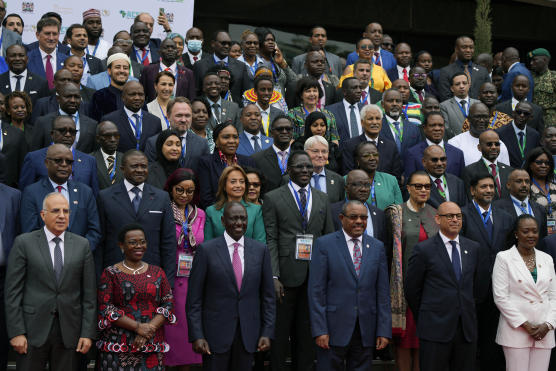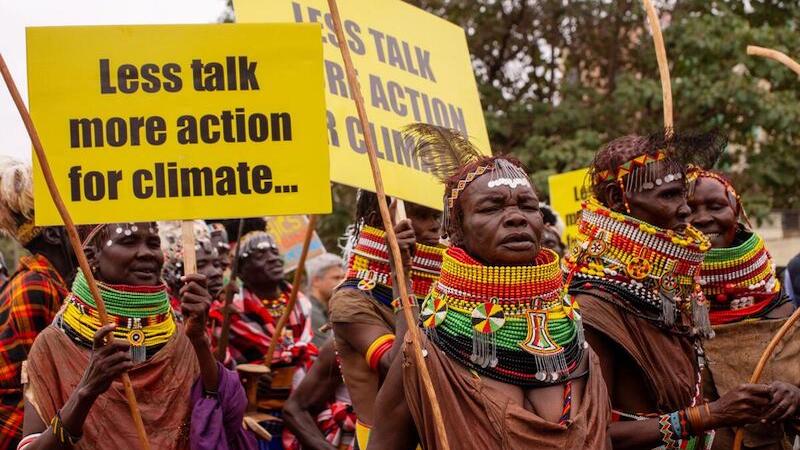Africa Climate Summit Issues Nairobi Declaration
AFRICA, 11 Sep 2023
Abayomi Azikiwe | Pan-African News Wire – TRANSCEND Media Service
Africa Climate Summit 2023: Driving Green Growth & Climate Finance Solutions for Africa and the World
7 Sep 2023 – Despite statements of intent, western industrialized countries have not yet provided the resources needed for the transition to renewable energy production which benefits the majority of people on the continent
Nairobi, Kenya, the commercial center for the East Africa region, hosted the Africa Climate Summit which attracted thousands of delegates, investors and observers to discuss the worsening plight of the continent as it relates to environmental degradation.
The meeting was scheduled from September 4-8 at the Kenyatta International Convention Center (KICC) where registered delegates from governments and non-governmental organizations articulated their views on what is needed in the present period to avert an even larger climate disaster for Africa’s 1.3 billion people.
This summit was held under the theme, “Africa Climate Summit 2023: Driving Green Growth & Climate Finance Solutions for Africa and the World.” The governmental leaders met for three days while the entire week was dedicated to the current situation and potential solutions.
Outside the ACS, there were thousands more representing coalitions, traditional communities and mass groupings, many of which were critical of the gathering and the way in which western governments, multi-national corporations and international financial institutions are seeking to dominate the dialogue on Africa climate issues and economic development. A host of delegates were present from the United States and the European Union (EU) making pledges to assist the AU member-states in halting the impact of greenhouse gas emissions and other pollutants.

Head of states and delegates pose for a group photo, during the official opening of the Africa Climate Summit at the Kenyatta International Convention Centre in Nairobi, Kenya, Monday, Sept. 4, 2023. The first African Climate Summit opened with heads of state and others asserting a stronger voice on a global issue that affects the continent of 1.3 billion people the most, even though they contribute to it the least.
(AP Photo/Khalil Senosi)
In the language for the summit overview, it states that:
“The inaugural Africa Climate Summit, championed by HE President [William] Ruto, aims to address the increasing exposure to climate change and its associated costs, both globally and particularly in Africa. With the expectation of escalating climate crises in terms of frequency and intensity, urgent action is required to mitigate these challenges. The Summit will serve as a platform to inform, frame, and influence commitments, pledges, and outcomes, ultimately leading to the development of the Nairobi Declaration.”
However, the previous commitments made by western states and multinational corporations have not yet been honored. The purpose of the ACS 2023 was to reach a consensus among African governments on a program to be taken to the United Nations Climate Summit (COP28) which will be held in the United Arab Emirates (UAE) in December.
The adoption of the Nairobi Declaration was designed to position the AU member-states in their negotiations within the broader international community. Nonetheless, it remains to be seen how the AU can either convince or force the industrialized capitalist states to provide the necessary reforms that will turn the tide towards green and sustainable energy.
During the ACS it was acknowledged by the AU member-states and some corporations that Africa is one of the least responsible regions for the rise in global warming. Consequently, the continent requires assistance in preventing further extreme weather events, droughts and the subsequent food deficits which are plaguing various regions of East Africa.
An article published in the French newspaper Le Monde on the ACS noted:
“The declaration called for ‘concrete action’ on reforms that lead to ‘a new financing architecture that is responsive to Africa’s needs’, including debt restructuring and relief.
Ruto said it was time to overhaul global financial systems that ‘perpetually place African nations on the backfoot. We demand a fair playing ground for our countries to access the investment needed to unlock the potential and translate it into opportunities,’ he said. Leaders also pressed the world’s wealthy polluters to honor their pledges, including to provide $100 billion a year for clean energy and to help them brace for climate disasters.”

Climate activists take to the streets at the Africa Climate Summit in Nairobi, Kenya, urging the African Union to lead by example and protect African biodiversity, end fossil fuels driving catastrophic climate change and invest in real solutions by shifting to solar and wind energy. Signs read “Less talk more action for Climate”.
Defeating Climate Change Requires a Struggle Against the Current World Order
As long as the multinational corporations and banks can earn enormous profits under the existing economic system, the realization of change will require organized pressure from the AU member-states and their constituencies. This ACS gathering was not the first time that these demands have been put forward to the leading imperialist states.
When Republic of South Africa President Cyril Ramaphosa paid a state visit to the U.S. nearly one year ago, he emphasized that his country along with others on the continent would need billions of dollars to address the goals set by the annual United Nations Climate Summit. Every year, the U.S., U.K. and the EU are able to veto significant resolutions at the COP meetings which would place definite responsibilities on the imperialist states.
During 2022, when the COP27 Summit was held in Egypt, a host of promises were made by the imperialist states which have yet to be fulfilled. Yet one year later, these same economic and political interests continue to pretend that they will make amends for their industrial and agricultural policies which are the main contributors to the rise in pollutants.
The New York Times wrote a report on the ACS pointing out that there are serious questions being raised by people in Kenya about the effectiveness of the Nairobi Declaration:
“Outside the halls of the convention center, Kenyans were asking tougher questions about whom the conference and its lofty goals really served. ‘The energy discussion masks our economic crisis,’ said Mordecai Ogada, an author and a leading Kenyan voice on environmental issues. ‘Yes, we get most of our electricity from renewables. But we pay foreign companies to generate that power exorbitantly in foreign currency,’ he said. ‘Manufacturing has become expensive, which drives inflation. As far as the lives of Kenyans are concerned, the source of energy is completely immaterial.’”
In Kenya over recent months, the government of President Ruto has lifted fuel subsidies and raised taxes on essential goods. The hardships caused by these measures sparked demonstrations which were organized by the political opposition in the country. In real terms, the Kenyan national currency has lost one-third of its value over the last two years.
The overall global crisis prompted by the COVID-19 pandemic and its consequences are largely to blame for the sharp rise in prices. Therefore, to insulate the people of Africa from external shocks, there must be a radical shift in the international division of labor and economic power which has reinforced the dependency inherited from the colonial system.
Africa News quoted a participant in the demonstrations involving thousands outside the ACS 2023 meeting. This activist called Babawale from the Friends of the Earth Africa said:
“We are here to demand that Africa’s energy system must be de-colonized, it must be brought out from the hands of the culprits, it is time for the African people to stand together and make a demand, that what we need now is systems change, not climate change, what we need now is that Africa’s energy systemic must be de-colonized. It should be put in the hands of people, this is not the time that we should promote carbon markets it is not going to put to an end the different climate crisis that Africa is facing.”
During the demonstrations by civil society and mass organizations surrounding the Kenyatta International Convention Center, people carried banners which read: “Stop the neo-colonial scramble for oil and gas in Africa.” In Kenya alone, the government would need approximately $US62 billion to address the necessity of reducing emissions which contribute to climate change.
AU member-states overall would require an estimated $US290 billion to $US440 billion to achieve the same objectives. These resources will not be given by the imperialist states absent of a protracted campaign for climate justice and a sweeping redistribution of wealth on a global scale.
__________________________________________
![]() Abayomi Azikiwe is the editor of Pan-African News Wire.
Abayomi Azikiwe is the editor of Pan-African News Wire.
Tags: Africa, Africa Climate Summit 2023, Climate Change, Environment, Global warming, Solutions
This article originally appeared on Transcend Media Service (TMS) on 11 Sep 2023.
Anticopyright: Editorials and articles originated on TMS may be freely reprinted, disseminated, translated and used as background material, provided an acknowledgement and link to the source, TMS: Africa Climate Summit Issues Nairobi Declaration, is included. Thank you.
If you enjoyed this article, please donate to TMS to join the growing list of TMS Supporters.

This work is licensed under a CC BY-NC 4.0 License.
